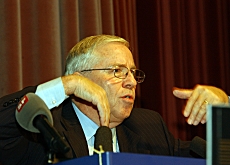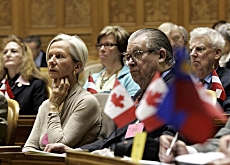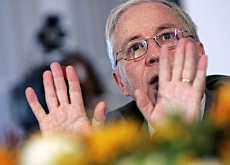Justice minister defends asylum law

Christoph Blocher has told the assembly of the Swiss Abroad that the new asylum and immigration laws are necessary to prevent social tensions.
The justice minister rejected accusations that the revision of the two laws, to be voted on in a referendum next month, ran counter to Switzerland’s humanitarian traditions.
In a speech to the annual Congress of the Swiss Abroad in Basel on Saturday Blocher dismissed allegations that Switzerland was too tough on refugees and foreigners.
“It’s not nice having to reject people. You can only justify it in the context of a bigger aim,” said the minister from the rightwing Swiss People’s Party.
“You have to be strong to send these people back. But the law is not inhumane, it continues to protect genuine refugees.”
Blocher’s speech comes ahead of a referendum on September 24, when Swiss voters will decide whether to accept harsher measures included in the revised law. They include cutting social welfare payments to asylum seekers and the raising of the maximum detention for foreigners awaiting deportation to 18 months.
The changes were approved by parliament last December, but were challenged by a coalition of centre-left parties, church groups and aid organisations, which collected enough signatures to force a referendum on the issue.
The revised law would also rule out the granting of admission to asylum seekers on humanitarian grounds, but will make it easier for those accepted to work and to be joined by their families.
The justice minister said human traffickers were responsible for most of the people who come to Switzerland seeking asylum. “[They] are organised criminals. Sending the asylum seekers back home within a couple of weeks is drying up their business.
Paradise
“The paradise that is Switzerland is not big enough for everybody.”
The revision of the two laws won the support of the Swiss Abroad assembly, with a majority of delegates recommending a yes vote during a debate on Friday.
But the president of the Swiss Abroad Council, Georg Stucky, said the result of the consultative vote – 38 votes in favour, 26 against – came as a surprise.
“I expected the result to be closer. I don’t ever remember such an emotional and lively debate in the assembly over the past 15 years,” Stucky said.
During the debate the opponents argued that the new laws went against Switzerland’s humanitarian tradition and United Nations children’s conventions, while supporters pointed out the country needed tougher laws to keep criminals away and stem worldwide migration.
Among the opponents was Jean-Paul Aeschlimann, a Swiss expatriate living in France, who disagreed with Blocher’s views.
“He is fundamentally against anything that has to do with foreigners and he is sceptical about anything to do with dual nationality. This is felt throughout his whole ministry,” Aeschlimann told swissinfo following Blocher’s speech.
However Regina Mäder, who now lives in Thailand, was impressed with Blocher’s speech. “I fully agree with his proposals to tighten asylum and immigrantion regulations; and he is a cunning speaker.”
Blocher told a news conference in Bern on Friday that the current asylum law, last revised two years ago, had achieved its goal of reducing the number of asylum seekers making groundless applications.
He said the number of asylum seekers had dropped by 12.5 per cent and that SFr92 million ($75 million) had been saved.
He added that there was no evidence of an increased number of rejected asylum seekers going underground, or that they had been forced into crime.
swissinfo
* Registered Swiss expatriates: (end 2005)
* Total: 634,216 (+11,159 up on 2004)
* Europe: 395,397, mostly France and Germany
* Americas: 163,122
* Asia: 30,451
* South Pacific: 27,229
* Africa: 18,017
The Swiss Abroad Council (assembly) is a body of elected and appointed members, and is the highest decision-making institution of the expatriate community.
It has currently 148 members, some who also live in Switzerland.
The assembly represents the interest of the Swiss abroad community and meets twice a year.
Under the revised asylum law, rejected asylum seekers would no longer receive social welfare payments and the maximum detention period for foreigners awaiting deportation would be raised to 18 months.
The granting of admission on humanitarian grounds has been ruled out. But it has been made easier for those granted asylum to be joined by their families and to work.
Also to be voted on in September will be a revision to Switzerland’s immigration law, called the Foreigners National Act, which favours EU and Efta nationals and limits the migration of non-European and unqualified workers.
Both laws were approved by parliament last December, but face a nationwide vote on September 24.

In compliance with the JTI standards
More: SWI swissinfo.ch certified by the Journalism Trust Initiative



You can find an overview of ongoing debates with our journalists here. Please join us!
If you want to start a conversation about a topic raised in this article or want to report factual errors, email us at english@swissinfo.ch.